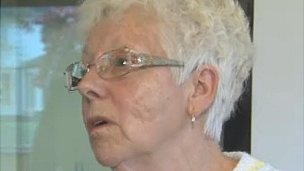Birmingham City Council liable for £757m equal pay claims
- Published
Birmingham City Council has revealed it will have to pay at least £757m to settle equal pay claims brought by mainly women who missed out on bonuses.
Last month 174 people who worked in traditionally-female roles won a ruling at the Supreme Court over the pay.
The £757m includes claims by that group and hundreds of other city council workers.
The remaining money the council still has to pay out is budgeted into the £600m it says it has to save by 2017.
Council leader Sir Albert Bore said the equal pay ruling had left the Labour-run council in a "horrendous position financially".
He reiterated warnings that entire services run by the authority, which has an annual budget of about £1bn, would have to be "decommissioned" to meet the budget shortfall.
He said he also expected the figures of claims to rise "but by how much, we don't know".
Sir Albert refused to give a figure of how many people could potentially submit claims.
The council leader said the authority could only afford to borrow £429m of the £757m figure without having to get special dispensation from the government to take out more loans.

Former home carer Joan Clulow said she did not feel guilty about the outcome of the case
The equal pay settlement figures were released publicly for the first time as part of a report to council chiefs by auditors Grant Thornton.
The council said at the end of March it still had to pay out £541m of the total £757m in claims.
It has predicted that by 2015-16 the council will have to pay about £75m a year to finance the debt.
The group of 174 former employees - all but four of them women - were dubbed the Abdulla Group after the woman whose name was at the top of the list, won the court ruling in October, which could have implications for other workers.
'Don't feel guilty'
The former staff had worked in such jobs as cooks, cleaners and care staff for the council and had discovered they had been denied bonuses given to staff in traditionally male-dominated roles such as refuse collectors and street cleaners.
The Supreme Court rejected the council's argument the claims should have been submitted through an employment tribunal within a six-month time limit of leaving their jobs.
Joan Clulow, 71, was one of the women who was part of the Abdulla group and worked as a home carer for the city council in Bartley Green and Weoley Castle for 27 years.
She said: "The council could have saved an awful lot of money if they had listened to us in the first place.
"I worked hard - I worked on Christmas Day, whenever they wanted me to. I don't feel guilty at all.
"I did a good job and I enjoyed my job - I deserved that pay."
Sir Albert said the city council was not the only authority in that situation, and that the Abdulla ruling had "implications for many more in the public and private sector".
However, he added the council was committed to abiding with the law.
A series of public meetings is due to start in the next few weeks to get taxpayers' views on which services should be cut.
The council leader said he had now ruled out holding a referendum among voters about whether to increase council tax by more than 1.6%.
- Published24 October 2012
- Published24 October 2012
- Published24 October 2012
- Published23 October 2012
- Published10 January 2012
- Published29 November 2011
- Published9 May 2011